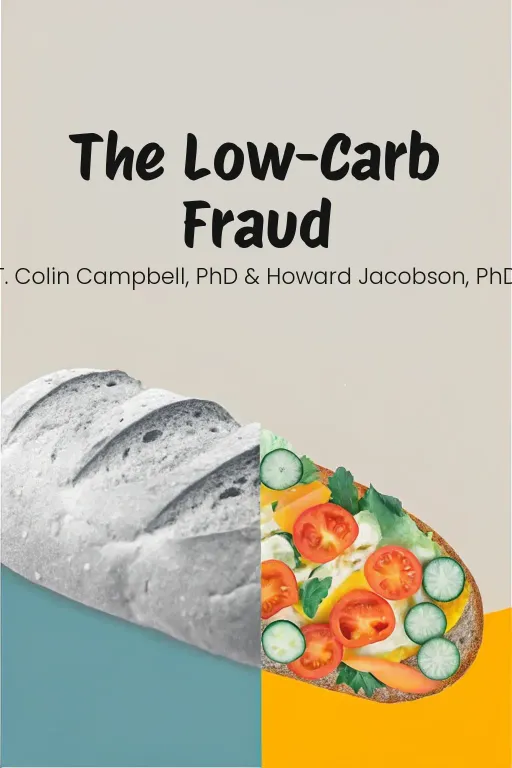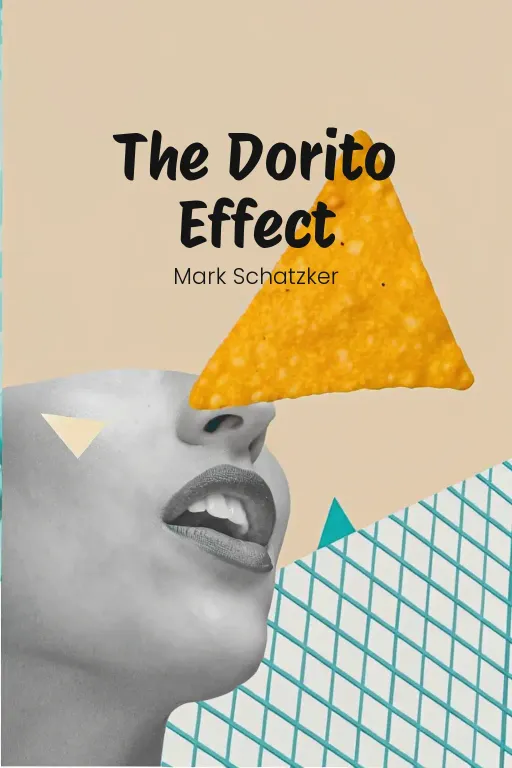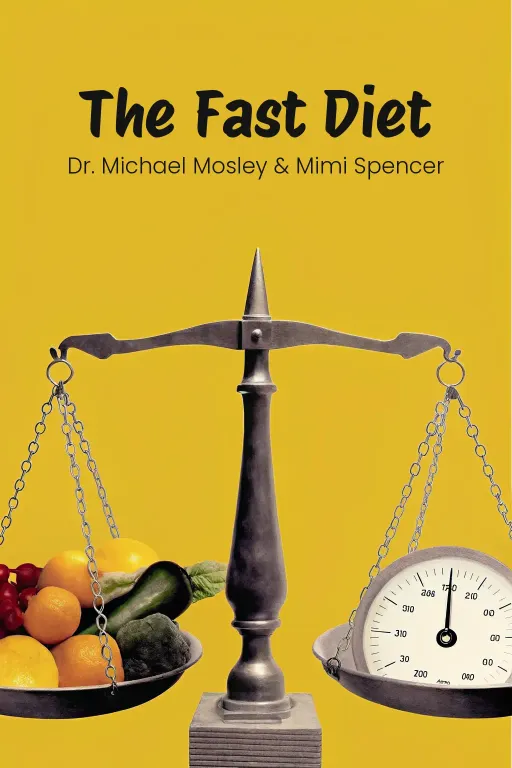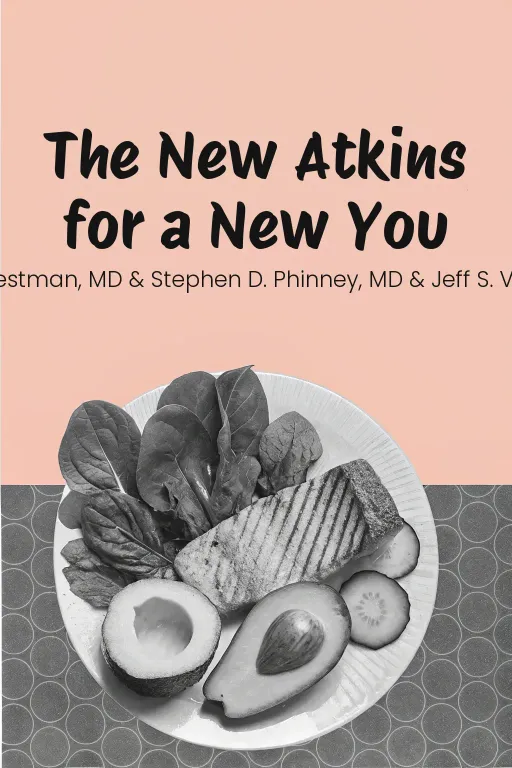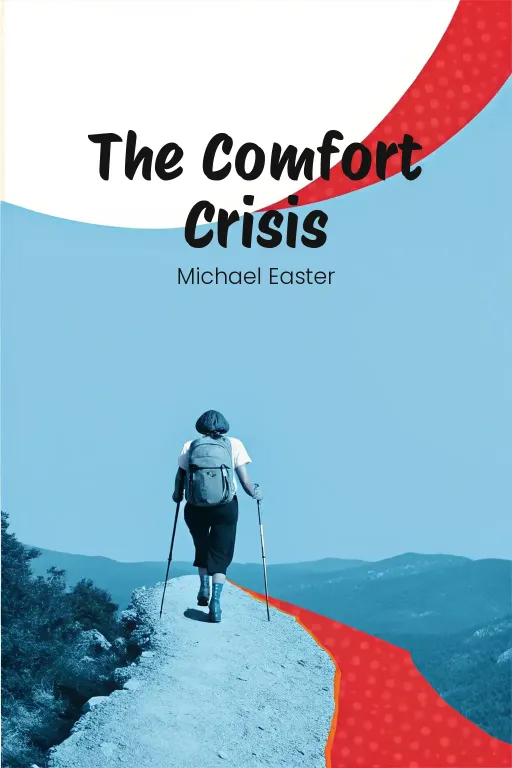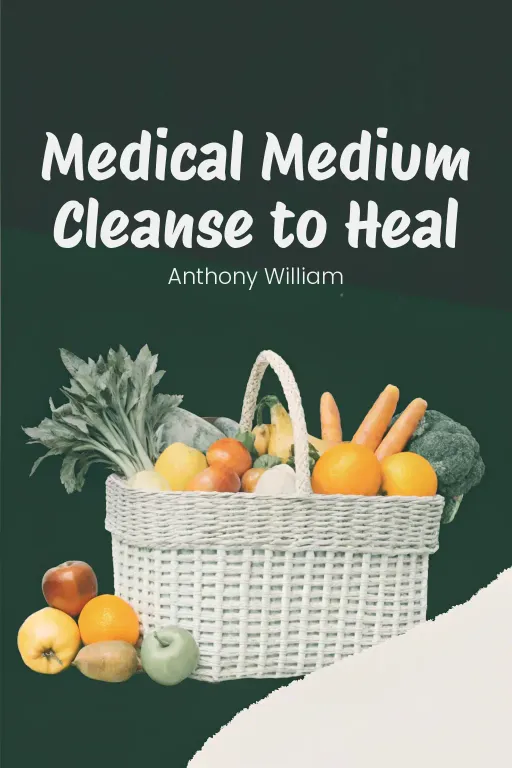
Beyond Bacon: Real Food, Real Health
Podcast by Beta You with Alex and Michelle
Beyond Bacon: Real Food, Real Health
Part 1
Michelle: Alright, welcome back! Let’s jump right in with a pretty provocative question: What if the diet you thought was “helping” you was actually, you know, messing you up in the long run? Alex: Exactly the question for today, Michelle! We're discussing "The Low-Carb Fraud" by T. Colin Campbell and Howard Jacobson. They really challenge the claims about low-carb diets. Big spoiler alert; it’s not the miracle solution it’s often made out to be. Michelle: Yeah, exactly because while you might see that initial weight loss, the authors basically say it's like, painting over a rusty car, right? It looks good for a bit, but you're not fixing the real problem, and there might be some serious consequences down the road. Alex: Precisely. Campbell and Jacobson don’t just bash low-carb diets though, their mission is to highlight the power of a whole food, plant-based approach to nourish your body. They draw upon decades of research that shows how a plant-based diet could help fight disease and really help you live longer. And as a bonus, it’s great for the planet, too. Michelle: Okay, so here’s what we’re going to do today, Alex, after that great intro. First, the not-so-great elements of low-carb diets—we're talking about the high fat, the high protein, and what that actually “does” to your body. Then we’ll look at the science behind plant-based nutrition. Alex: Exactly and we'll finish by looking at why, if plant-based eating is so great, we haven't fully embraced it as a society. We're talking about everything from misleading marketing to just deeply ingrained habits. Michelle: So, we're really digging in. Stripping away all the nonsense to find the core truth, or the "bean-y" truth as Alex likes to say, right?
The Flaws of Low-Carb Diets
Part 2
Alex: Okay, Michelle, so let's dive in. Low-carb diets, right? They're always presented as this edgy, almost rebellious solution to everything that ails us. The “bacon and butter fixes everything” crowd tells us carbs are the enemy. So, what's the deal with this narrative? Why is it so off base? Michelle: Yeah, they're like the punk rock of the diet world, aren't they? All leather jackets and anti-establishment vibes. But I smell a scam. Alex, give us the lowdown – why is this whole low-carb dogma so problematic? Alex: Well, really, the core issue is how low-carb diets just blanket all carbohydrates as one big “bad guy.” They don't differentiate between, say, sugary sodas and white bread, and nutrient-packed carbohydrates found in things like oats, sweet potatoes—whole plant foods basically. It’s a massive oversimplification, and doesn't factor in the actual nutritional qualities of these foods. Michelle: So, it's like saying all music is terrible just because you hate polka. A bit of a stretch, wouldn't you say? Alex: Precisely! And people like Gary Taubes, a big name in the low-carb world, really leans into this thinking. He pushes this idea that “carbs = bad calories.” But think about fruit, full of vitamins, antioxidants, and fiber. And legumes, high in protein. These diets demonize foods that are actually good for you—just to push their anti-carb message. It's not right. Michelle: Exactly! And you end up seeing people basically living off meat and cheese thinking they're being healthy. The irony is brutal – cutting out carrots and apples, yet calling bacon a health food. Alex: It's completely backward. And the science backs it up. Look back—when Dr. Robert Atkins released Diet Revolution in the 70s, it was a way to lose weight and still eat things like butter-soaked steaks. It felt revolutionary at the time because it was turning its back on the low-fat craze of the 80s and 90s. But Atkins didn't take into account—and Campbell points this out in The Low-Carb Fraud—that diets with a lot of saturated fats and animal protein have major long-term health risks. Michelle: Which include, if I'm not mistaken, increased cholesterol, heart disease, all that fun stuff? Alex: Absolutely. Research links these high-fat, high-protein diets to things like inflammation, insulin resistance, and cardiovascular disease. For example, diets high in animal products also tend to be low in fiber, leading to high cholesterol. And fiber is crucial—it’s essential for gut health, lowering cholesterol, and reducing cancer risk. Michelle: Right. But, hey, low-carb folks always say, "I lost weight so fast!" And who doesn't want instant gratification these days? So, what's “really” going on there? Alex: That quick weight loss? It’s water and glycogen depletion, not actual fat. When you cut carbs, your body burns through its glycogen stores, which hold water. The scale goes down, sure, but it's not sustainable. Long-term, it often leads to nutrient deficiencies. And when you inevitably go back to eating normally, the weight comes right back, sometimes extra. This yo-yo effect is terrible for metabolic health. Michelle: So low-carb diets are like crash courses in screwing up your metabolism? Quick results with a nasty payback down the line. But there's gotta be a psychological angle to why these diets are so popular, right? Alex: Absolutely, and that's key. Low-carb diets appeal on an emotional level. They feel indulgent, you can eat rich, fatty things and still feel like you're breaking the “rules.” That feeling of freedom – bacon and still seeing the numbers go down – that’s “really” seductive. But it's a false promise. Michelle: Plus, they've got a built-in identity, don't they? Keto, Paleo – it's like joining a club where everyone's unified against the evil carbs. Alex: Exactly! There’s a sense of community, which can help people stick to it in the short term. But we can't ignore the side effects—headaches, fatigue, constipation. These diets are fundamentally hard, because they cut out foods our bodies actually need. Over time, these negative effects build up, and people end up quitting. Michelle: And here's the part I find hilarious – the pendulum swing. Low-fat diets in the 80s told us to eat all the carbs, and when that didn't fix obesity, we swung right to the opposite extreme. Low-carb is just another flip of that coin, vilifying one macronutrient instead of seeing the whole picture. Alex: That's right. Campbell calls it “reductionist thinking.” Diets like Atkins focus so much on one "bad" thing—carbs—that they miss holistic dietary patterns. The big picture? Whole, plant-based foods are the foundation of the healthiest diets globally. Look at the Okinawans, or traditional diets in rural China. Those communities eat a high percentage of plant-based carbs and live longer, with fewer chronic diseases. That's solid evidence that carbs aren't the bogeyman. Michelle: So, basically, if Atkins had swapped out that steak for sweet potatoes, his diet might've been a lot more… defensible? Alex: Absolutely! It's not carbs themselves that are bad; it's the processed, refined ones stripped of all the good stuff. Whole, plant-based carbs come bundled with everything your body needs – vitamins, minerals, fiber, and antioxidants. By cutting them out, you miss out on these crucial health benefits. Michelle: Yet, here we are, in a world where keto brownies exist and sweet potatoes are somehow “controversial.” It's like the perfect storm of marketing brilliance and nutritional nonsense. Alex: That's the power of the food industry. Low-carb diets align with profit-driven motives, like selling expensive low-carb snacks and protein powders. The health argument becomes something profitable, even at the cost of long-term well-being. Michelle: So, where does this leave us? If we're tearing down this bacon tower, what's the alternative – a plant-based approach? Alex: Exactly. Plant-based diets emphasize whole foods in their unprocessed or minimally processed forms. They include those nutrient-rich carbohydrates low-carb diets demonize, but alongside the broader benefits of reduced saturated fats and more fiber. Even making small changes in this direction can have a big impact on your health.
The Whole Food, Plant-Based (WFPB) Diet
Part 3
Alex: Exactly. And that critique really opens the door to a scientifically backed alternative: the Whole Food, Plant-Based diet, or WFPB. It really flips the script on the low-carb idea. Instead of worrying about carbs or macronutrient ratios, the focus is on the “quality” of the food. Think whole grains, legumes, fruits, veggies, nuts, seeds—foods that offer great nutrition and support long-term health. Michelle: So it is the anti-fad diet. No sneaky hacks or shortcuts, just real food that's good for you, and good for the planet, which is a bonus. But, Alex, how is this different from every other diet claiming to be super healthy? What actually does the WFPB diet entail? Alex: It's about keeping foods as close to their natural state as possible, so minimal processing. Take whole grains, for example. They include the bran, germ, and endosperm, all packed with fiber, vitamins, and antioxidants. Compare that to refined grains, like white rice or white bread, where pretty much all those nutrients are stripped away for texture or shelf life. And, it extends to legumes, too – lentils, black beans, chickpeas – protein, fiber, and minerals, without saturated fats from animal proteins. Michelle: Like eating food that remembers where it came from, yeah? Nothing too messed with, no mystery ingredients. But is the fiber thing a bit overdone? I mean, most people don't exactly crave oatmeal or kale chips. Alex: I'll admit, fiber isn't sexy. But, it's vital. Imagine dietary fiber as a multitasking superhero – it improves digestion, regulates blood sugar, and it feeds the good bacteria in your gut. And those bacteria are key for everything from your immune system to even your mental health. Without enough fiber, which animal products completely lack, well, we're risking chronic diseases like heart disease, diabetes, and even some cancers. Oh, and antioxidants in leafy greens like spinach and kale help with oxidative stress, which is linked to aging and cell damage. Michelle: More kale, less chaos, got it. And you've probably got a study or two ready to back this up. Alex: Absolutely. One of the key pieces of research supporting the WFPB diet is T. Colin Campbell’s China Study. It's one of the most thorough nutrition studies ever, looking at people across rural and urban China. So, the findings were pretty striking– communities eating mainly plant-based diets had super low rates of chronic diseases like cancer, diabetes, and heart disease. Whereas, urban populations more focused on animal products had notably higher rates of the same conditions. Michelle: The more burgers you eat, the more you fall into a Western health statistic? Depressing, but not surprising. What stood out to you most from the study? Alex: How plant-based carbs, like vegetables, rice, and legumes, correlated with better cholesterol levels and overall metabolic health. Diets high in animal fats and proteins were linked to inflammation and higher disease rates. So, prioritizing nutrient-dense foods over calorie-dense options is the key. Michelle: Right, so solid metabolic health, low disease rates. But, are there any real-world examples of this working, particularly, in extreme cases? Alex: Definitely. Dr. Caldwell Esselstyn, known for reversing heart disease, has transformed patients' lives with the WFPB diet. One case involved a middle-aged man with heart disease that was so severe. Surgeries weren't even an option for him. Dr. Esselstyn put him on a completely plant-based diet, no animal products, processed foods, or oils. You know, over time, his symptoms not only improved, but his imaging showed a reversal in arterial blockages. That's a game-changer where someone uses food to heal what was thought to be kind of irreversible. Michelle: That's pretty amazing. Like a nutritional underdog story, right? How does this stack up against someone going keto, dropping, like, twenty pounds, you know, quickly? What do you say to the people only after those fast results? Alex: Keto might lead to quick weight loss. But, it's driven by water depletion and the loss of glycogen, temporary effects that bounce back as soon as you eat carbs again. WFPB, on the other hand, gently lowers calorie density while maintaining nutrients. Fiber fills you up, antioxidants heal you from the inside, maybe also let you lose weight gradually without counting calories obsessively. And, it doesn’t come with risks like spiking cholesterol or poor gut health from fiber deficiency the way keto does. Michelle: Get it. Keto's a sprint, WFPB's a marathon. Here's the other thing, though. People think eating this way is a sacrifice. Aren't plant-based meals a little, well…boring? Alex: Another misconception! It’s really about abundance and flavor– colorful plates of roasted veggies, lentil curries, salads with tahini dressing. When people make the change, they often feel more satisfied and energized, because their meals nourish both their bodies and taste buds. Michelle: Makes sense. But, let's zoom out even more. Low-carb diets never tackle sustainability. How does eating completely plant-based work for the planet? Alex: Ah, another strength of the WFPB diet. By reducing how much we rely on animal agriculture, which is a main cause of deforestation, emissions, and water depletion, the diet directly supports environmental sustainability. By eating more plants and fewer animal products, we reduce our ecological footprint, making it a win-win for personal health and the environment. Michelle: Not only is it harder to clog your arteries, but you're also not contributing to clogging the atmosphere. A twofer. But the picture you’ve painted is very idyllic: health, sustainability, vibrant meals. What's the catch? Why isn't everybody doing this? Alex: It’s not just about food but involves cultural and systemic shifts. So many people face barriers, from misleading marketing about diets to economic access and food deserts. But even small, incremental changes can make a big difference, like swapping one meat-heavy meal with a plant-based alternative.
Systemic Barriers to Nutritional Reform
Part 4
Alex: Understanding all the benefits of a whole-food, plant-based diet really begs the question: with all these advantages, why isn't it more widely adopted? Michelle: Exactly! And that’s where it gets interesting, Alex. Today we’re not just talking about individual food choices. We’re diving into the systemic barriers blocking nutritional reform. Think major industry influence, cultural norms, even how science itself can sometimes work against healthy eating. And we’re going to wrap it up with actionable steps we can take. Alex: Right, so let's kick things off with how the food and pharmaceutical industries kinda shape what we eat and what we believe about health. Michelle, you ever notice how heavily meat and dairy are marketed? All that nostalgia, tradition, and even patriotism they throw in? Michelle: Seriously! Every other commercial is selling the all-American dream of burgers sizzling on the grill. It’s marketing genius, really—makes you think eating steak is your patriotic duty. Alex: That's the crux of the matter. The food industry romanticizes diets packed with animal products, obscuring the real cost when it comes to health and the environment. Take the obsession with protein, for example. Marketing tells us we need tons, and it has to come from meat or dairy. But T. Colin Campbell's research and “The China Study” clearly link high animal protein intake to chronic stuff like heart disease and diabetes. Michelle: Meaning grandma’s roast dinner commercial might tug at the heartstrings, but it's actually serving up a constant stream of inflammation. And Big Pharma isn’t exactly rushing in to challenge this, are they? Alex: Sadly, no. A lot of pharmaceutical companies actually benefit from this cycle. Instead of getting to the root cause of preventable diseases, like type 2 diabetes or heart disease, they push medications as the go-to solution. Think about it, insulin for diabetes becomes a lifelong prescription, even though studies repeatedly show plant-based diets can reverse the disease in many cases. Michelle: It's massively ironic, isn’t it? The more preventable these ailments are, the less incentive Big Pharma has to, you know, let people actually escape needing their drugs. “Why eat lentils when we’ve got pills?” That's the unspoken slogan. Alex: Exactly, and this profit-driven system skews how we look at health. It keeps us locked on treatment instead of prevention. But systemic change? It's within reach. We just need to start dismantling the economic advantages given to animal agriculture and start steering subsidies towards plant-based farming. Michelle: Okay, but what if we had honest labels on processed meat that warned, "May contribute to heart disease and cancer"? You think anyone would still be reaching for those hot dogs at the summer barbecue? Alex: Maybe not. But we've seen similar strategies work before. Look at tobacco. Public health campaigns and mandatory labeling slashed consumption dramatically. Transparency and education can empower people to make informed food choices, too. Michelle: Makes sense. But beyond industry tactics, what about science itself? We've talked about Campbell’s critique of reductionism—isolating single nutrients instead of big-picture diets. How does that contribute to these barriers? Alex: Well, this reductionist approach has definitely skewed how we understand nutrition. Look at low-carb advocates, for instance. They've built entire diets by focusing on short-term effects like rapid weight loss, or lower blood sugar after a meal. But they ignore how these isolated results can compromise overall health down the line. Long-term, high-protein diets are linked to chronic inflammation and higher cholesterol. Michelle: So it’s like scientific tunnel vision—fixating on one tree and missing the entire, thriving forest. You got a classic example? Alex: Campbell’s early research offers a great case. He found that, in the Philippines, malnourished kids consuming higher amounts of animal protein were actually “more” likely to develop liver cancer. This went against the assumption that more protein always means better health. His work emphasized the importance of looking at entire diets in context, not just isolated nutrients. Michelle: And yet, mainstream science still loves its shortcuts, right? Suddenly, low-carb studies are shouting, "Carbs cause obesity!"—never mind that they’re lumping doughnuts and sweet potatoes into the same category. Alex: Bingo! That conflation perpetuates myths, like "all carbs are bad." But holistic studies—Campbell’s work, or data on traditional plant-based diets—show that whole, complex carbs are actually linked to disease prevention and longevity. Broader research perspectives offer us a lot more to work with. Michelle: So, a headline that says, “Sweet potatoes: Good for Okinawans and you” isn’t eye-catching enough, but bacon steals the spotlight. Got it. So, what's being done to combat all this reductionist noise? Alex: Well, promoting holistic nutrition research is crucial, but it needs policy support. Governments can incentivize farmers to grow more nutrient-dense plant foods instead of propping up industries that heavily process animal products. It helps human health, and it directly supports the planet too. Michelle: But, suggesting this is one thing; competing with the billion-dollar meat and dairy lobbies is another. What’s the real path forward here? More education? Alex: Education’s key, but it’s gotta be creative and accessible. Grassroots efforts like plant-based cooking classes or free community meal programs can showcase how delicious and practical WFPB diets really are. Misinformation thrives in a vacuum; we need to fill that space with evidence and give people the tools they need. Michelle: So instead of, you know, telling people to "Eat less meat," the message is more like, "Check out how awesome these plant-based meals can be." Create demand in a fun way. Alex: And as demand rises, we can push for policies that make these foods more affordable and accessible. Subsidizing fruits and vegetables, for example, would address socioeconomic hurdles that prevent many people from shifting to healthier diets. Michelle: So we're talking about a total systems overhaul – policy reform, education, grassroots movements all working together to flip the script. It's ambitious, but it feels achievable. Alex: Absolutely. If we create systemic changes that showcase the benefits of WFPB diets—on individual health, scientific discourse, and the environment—we’ll move from battling barriers, to actually dismantling them.
Conclusion
Part 5
Alex: Okay, Michelle, let’s bring this home. We kicked things off by digging into the allure of low-carb diets, right? That promise of fast weight loss, the feeling of indulging, and that whole rebellious “anti-carb” vibe. Michelle: Yeah, that whole “stick it to the carbs” mentality. But we quickly saw that those long-term health risks, like heart issues and inflammation, “really” overshadow any short-term wins. It’s like, is it “really” worth it? Alex: Exactly. These diets tend to paint all carbs with the same brush, totally overlooking the essential nutrients and fiber you get from whole, plant-based foods. That's why we shifted the focus to the Whole Food, Plant-Based approach—it’s backed by science, it’s sustainable, and it’s incredibly good for you. It’s not about counting calories or cutting things out, but about loading up on real, unprocessed foods that nourish you inside and out. Michelle: So, less about restriction, more about abundance of the right stuff. Then we kind of zoomed out, tackled the bigger picture. How do cultural norms, industry influence, and, you know, overly simplified science keep these low-carb myths alive? It’s not just about individual choices, is it? Alex: No, it's this whole interwoven system, but one we can untangle with better education, smarter policies, and real grassroots movements for change. It’s a challenge, but definitely not impossible. Michelle: So, what's the takeaway, then? Practical steps. Alex: Right, so here’s the question for everyone listening: how can you start moving towards a diet that supports both your health and the planet? Maybe it’s just adding a few more plant-based meals each week, swapping out that animal-based snack for some nuts, or reaching for an apple. Small changes add up. Michelle: And while you're at it, maybe give a second thought to the diets and trends we're constantly being sold. Ask yourself, is this “really” sustainable, or is it just a temporary fix, you know, “paint over rust”, as you said? Alex: Exactly! We should be aiming for something deeper—health that lasts, choices that empower, and food that truly fuels us in every way. Michelle: So it’s not just about a diet, it is a lifestyle. Alex: Precisely, because when we focus on whole, plant-based foods, we’re not just changing what’s on our plates—we’re transforming our lives, our communities, and even the world. And that’s a shift we all deserve. Michelle: Well said, Alex. As always, thanks for tuning in, everyone. Let’s keep questioning, keep learning, and keep eating in a way that helps us thrive. Until next time! Alex: Take care, and go try those lentils!

